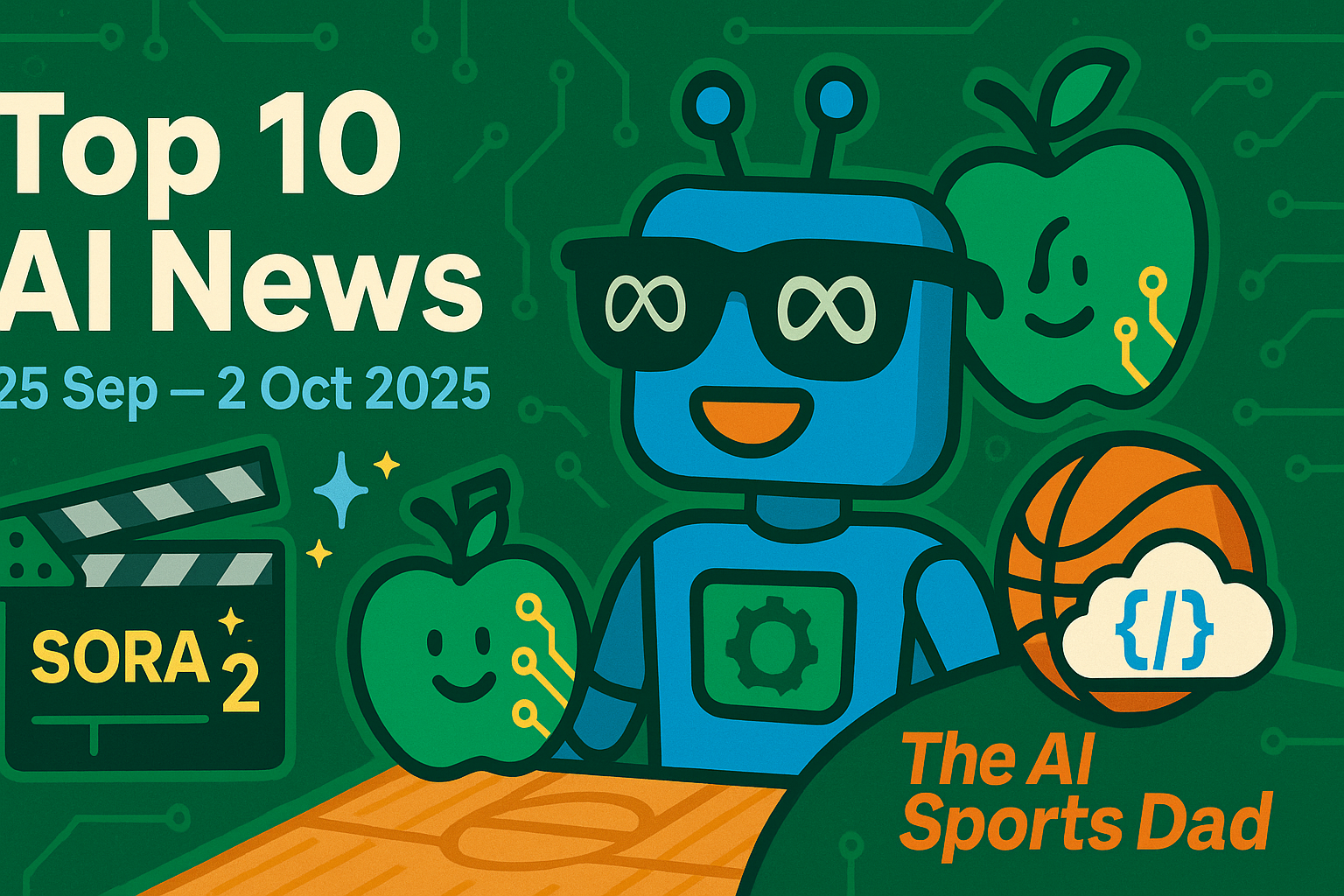The last week of September 2025 delivered a flurry of AI news that goes well beyond lab announcements and boardroom deals. Meta started mining your chat history for ad data, OpenAI shipped a video generator that turns text into cinema-quality clips, and the UK government asked Apple to weaken encryption, moves that will shape how families use smartphones, protect kids online, and trust the cloud. Here’s the AI news September 2025 produced that matters most to everyday users

Meta Turns Your Chats Into Ad Fuel
Starting 16 December, every conversation you have with Meta AI on Facebook or Instagram will feed the company’s recommendation engine. That casual query about school uniforms or birthday cake ideas? Meta plans to log it, analyse it, and serve you adverts based on your chats—whether they’re typed or spoken. The firm says it will exclude “sensitive” topics like religion and health, but there’s no opt-out, and with over a billion people using Meta AI each month, the scale of this data harvest is staggering.
For parents juggling family admin on Instagram DMs, this change means yet another layer of surveillance baked into the daily scroll. Small businesses that advertise through Meta may see tighter targeting, but privacy advocates warn the move deepens profiling in ways that feel more intrusive than helpful. Meta has already faced criticism over users unwittingly sharing personal queries in public feeds, and this December rollout raises fresh questions about consent and control.
OpenAI Launches Sora 2 Video Tool
On 30 September, OpenAI unveiled Sora 2, a standalone video-generation app available in the United States and Canada. The new model creates clips that obey the laws of physics, adds synchronised dialogue and sound effects, and even lets users insert themselves into scenes via a “cameo” feature. Chief executive Sam Altman announced the app is ready for download, marking OpenAI’s push to bring cinematic video creation to anyone with a smartphone.
For everyday creators—think parents filming school plays or small businesses launching product demos—Sora 2 lowers the bar to Hollywood-style production. Marketing videos, tutorials, and social content can now be generated without specialised editing skills. But the same tools that democratise creativity also amplify deepfake risks; inserting real people into fabricated scenarios becomes trivially easy, and that presents new headaches for trust and authenticity online.
California Demands AI Safety Checks
California Governor Gavin Newsom signed the Transparency in Frontier AI Act (SB‑53) into law on 29 September. The legislation compels any AI developer with revenues above US$500 million to publish safety frameworks and file catastrophic-risk assessments before releasing advanced models. Companies that skip these steps face fines of up to US$1 million per violation, and the law adds whistle-blower protections for employees who flag unsafe practices.
SB‑53 aims to close regulatory gaps by forcing tech giants to ask whether their models could, for instance, help someone build a biological weapon or destabilise critical infrastructure. For everyday users, the upside is potentially safer tools and clearer disclosures; the downside may be slower releases and higher subscription prices as compliance costs trickle down. Other jurisdictions are watching California closely, and SB‑53 could become a blueprint for AI regulation worldwide.
Meta’s Smart Glasses Get a Display
Meta’s Ray‑Ban Display glasses hit selected U.S. shops on 30 September, priced at US$799. These are the company’s first smart specs with a built-in display and a companion “Neural Band” wristband. The glasses project messages, translations, and AI answers directly onto the lens, while the electromyography wristband interprets finger movements to control the interface—no tapping or swiping required. Meta says the product will expand to Canada, France, Italy, and the UK during 2026.
For early adopters, the Ray‑Ban Display represents a step toward wearable AI that blends into everyday fashion rather than looking like a gadget from a sci-fi film. Small businesses could use the tech for hands-free customer support or on-the-job training. But at £600-plus and limited availability, these remain a curiosity for tech enthusiasts rather than a mass-market product—at least for now.

ChatGPT Adds Parental Controls
OpenAI rolled out parental controls for ChatGPT in late September after a lawsuit linked to a teenager’s suicide. Parents and teens can now link accounts, set quiet hours, disable voice or image generation, and decide whether conversations are used to train future models. Crucially, parents cannot read chat transcripts, but they will receive alerts if the system detects serious safety risks.
The move gives families more oversight of children’s AI use and addresses mounting concerns about mental health, privacy, and harmful content. While the controls won’t prevent every risky interaction, they signal a recognition that chatbots play an active role in young people’s lives and need guardrails. Other AI providers are likely to adopt similar features as regulatory and public pressure builds.
NBA Teams Up With AWS for AI Stats
Amazon Web Services and the National Basketball Association announced a multi-year partnership on 1 October to create “NBA Inside the Game.” The service will use machine-learning models to analyse player movements in real time, generating advanced statistics, insights, and interactive features for fans watching via broadcasts or apps.
Sports fans will see richer data overlays—think shot probability, defensive positioning heatmaps, and personalised player comparisons—all powered by AI. Teams gain deeper analytics to refine coaching decisions and scout opponents, while small businesses in sports media can tap into growing demand for AI-driven storytelling and interactive ads. It’s another sign that AI is moving from the lab to the living room, reshaping how we experience live sport.
Opera’s New Privacy-First Browser
Opera launched Neon, a desktop browser with generative AI baked in, on 30 September. The headline feature, “Neon Do,” can fill forms, compare prices, or draft code snippets directly on web pages. “Tasks” pulls information from multiple sites to answer complex queries, and “Cards” lets users save and reuse prompts. Crucially, all processing happens on the user’s device rather than in the cloud, keeping sensitive data local.
For privacy-conscious users, Neon offers an alternative to browsers that send every query to remote servers. On-device AI also sidesteps some regulatory scrutiny around data collection. Small businesses could harness Neon to streamline web-based workflows—think automated expense reports or side-by-side vendor comparisons—though the service requires a paid subscription.
Windows PCs Get Dedicated AI Chips
Microsoft’s latest Copilot+ PCs now ship with Neural Processing Units (NPUs) capable of more than 40 trillion operations per second. These dedicated chips handle AI tasks such as image creation, background blur, and live captions locally, improving speed and conserving battery life on laptops.
For everyday users, NPUs mean smoother AI experiences without draining the battery or needing a constant internet connection. Features like real-time transcription or automatic photo enhancement run faster and more privately because they don’t ping a remote server. Small enterprises benefit from longer battery life and on-device privacy, making AI tools more practical for field work or travel.
Digital Euro Enlists AI Fraud Fighter
The European Central Bank awarded a four-year contract worth up to €237 million to Portuguese AI firm Feedzai on 2 October. Feedzai will build a system that scores digital-euro transactions for fraud risk, comparing each payment against a customer’s typical behaviour to flag anomalies in real time. Legislative approval for the digital euro remains pending, but the ECB is laying the groundwork for launch.
Fraud protection is critical if consumers and merchants are to trust any new digital currency. Feedzai’s AI will analyse patterns to catch suspicious activity before losses mount, potentially reducing fraud for shoppers and small businesses alike. If the digital euro goes live, it could also bring lower payment fees and faster settlement, making cross-border commerce smoother across the EU.
UK Orders Apple to Build iCloud Backdoor
Britain issued a fresh order on 1 October asking Apple to create a backdoor into its iCloud storage for UK users. The Financial Times reported the move follows Apple’s decision to withdraw Advanced Data Protection—end-to-end encryption for iCloud backups—from British customers. Apple has consistently opposed building backdoors, arguing they undermine security for all users, and the company has appealed earlier government notices.
The order reignites the encryption debate: should governments have a “key” to unlock user data, or does any backdoor weaken privacy protections for everyone? If enforced, the policy could expose millions of UK iCloud customers to greater surveillance and set a precedent that other governments may follow. Small businesses relying on Apple services for customer records or intellectual property must watch closely, as any backdoor could become a target for malicious actors as well as law enforcement.
Key Takeaways
- Privacy under pressure: Meta will mine your chats for ad targeting from December, and the UK wants Apple to build an iCloud backdoor—both moves shrink the circle of private digital space.
- Creativity gets easier: OpenAI’s Sora 2 makes cinematic video generation accessible to anyone, but deepfake risks grow alongside creative potential.
- Regulation catches up: California’s SB‑53 forces AI developers to assess catastrophic risks before launch, signalling a shift toward mandatory transparency and safety checks.
- Families gain tools: ChatGPT parental controls and on-device AI in Windows PCs offer parents more oversight and privacy, addressing real-world concerns about kids and data security.
- AI reaches the pitch: The NBA–AWS partnership brings real-time AI stats to sports broadcasts, showing how machine learning is reshaping fan experiences beyond tech circles.
CTA:
Want to stay ahead of AI changes that actually affect your family? Join the squad for weekly roundups and practical guides, or subscribe on YouTube for quick explainers and contrarian takes on the latest AI news.
Sources
C) LINKS & MEDIA
Internal links (5):
- What is AI? A Guide for Parents →
/what-is-ai-guide-parents/(anchor: “understand how AI shapes their digital lives”) - Premier League 2025/26 Predictions →
/premier-league-2025-26-predictions/(anchor: “AI is moving from the lab to the living room, reshaping how we experience live sport”) - Join the squad →
/join-the-squad/(anchor: CTA button) - Suggest creating a “ChatGPT Parental Controls Guide” or “AI Privacy for Families” pillar page to link from “addressing mounting concerns about mental health, privacy, and harmful content”
- Suggest creating an “AI Tools for Small Businesses” category page to link from “small businesses launching product demos”
External links (4):
ECB picks AI startup to prevent digital euro fraud | Reuters → https://www.reuters.com/business/finance/ecb-picks-ai-startup-prevent-digital-euro-frauds-2025-10-02/ (anchor: “awarded a four-year contract”)
Why it helps: Official Reuters report on Feedzai contract.
Meta to use AI chats to personalize content and ads from December | Reuters → https://www.reuters.com/business/media-telecom/meta-use-ai-chats-personalize-content-ads-december-2025-10-01/ (anchor: “starting 16 December”)
Why it helps: Authoritative source confirming the policy change and timeline.
California’s Newsom signs law requiring AI safety disclosures | Reuters → https://www.reuters.com/legal/litigation/californias-newsom-signs-law-requiring-ai-safety-disclosures-2025-09-29/ (anchor: “signed the Transparency in Frontier AI Act”)
Why it helps: Direct Reuters coverage of SB‑53 signing.
OpenAI launches parental controls in ChatGPT after California teen’s suicide | Reuters → https://www.reuters.com/legal/litigation/openai-bring-parental-controls-chatgpt-after-california-teens-suicide-2025-09-29/ (anchor: “rolled out parental controls”)
Why it helps: Context on the lawsuit and policy response.
Originally posted 2025-10-03 00:00:39.